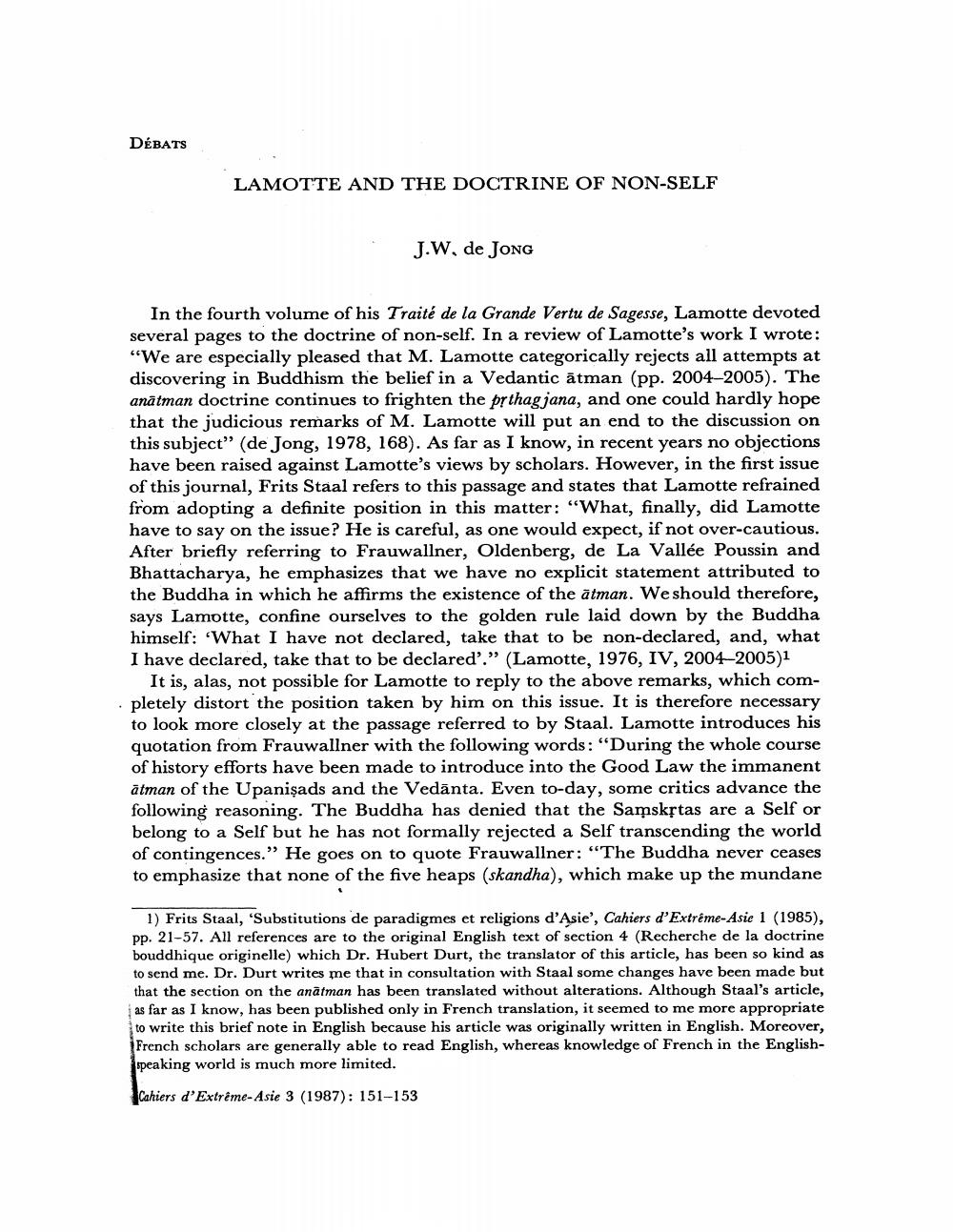Book Title: Lamotte And Doctrine Of Non Self Author(s): J W De Jong Publisher: J W De Jong View full book textPage 1
________________ DÉBATS LAMOTTE AND THE DOCTRINE OF NON-SELF J.W. de JONG In the fourth volume of his Traité de la Grande Vertu de Sagesse, Lamotte devoted several pages to the doctrine of non-self. In a review of Lamotte's work I wrote: "We are especially pleased that M. Lamotte categorically rejects all attempts at discovering in Buddhism the belief in a Vedantic ātman (pp. 2004-2005). The anātman doctrine continues to frighten the prthag jana, and one could hardly hope that the judicious remarks of M. Lamotte will put an end to the discussion on this subject" (de Jong, 1978, 168). As far as I know, in recent years no objections have been raised against Lamotte's views by scholars. However, in the first issue of this journal, Frits Staal refers to this passage and states that Lamotte refrained from adopting a definite position in this matter: "What, finally, did Lamotte have to say on the issue? He is careful, as one would expect, if not over-cautious. After briefly referring to Frauwallner, Oldenberg, de La Vallée Poussin and Bhattacharya, he emphasizes that we have no explicit statement attributed to the Buddha in which he affirms the existence of the ātman. We should therefore, says Lamotte, confine ourselves to the golden rule laid down by the Buddha himself: 'What I have not declared, take that to be non-declared, and, what I have declared, take that to be declared'.” (Lamotte, 1976, IV, 2004-2005) It is, alas, not possible for Lamotte to reply to the above remarks, which completely distort the position taken by him on this issue. It is therefore necessary to look more closely at the passage referred to by Staal. Lamotte introduces his quotation from Frauwallner with the following words: "During the whole course of history efforts have been made to introduce into the Good Law the immanent atman of the Upanişads and the Vedānta. Even to-day, some critics advance the following reasoning. The Buddha has denied that the Samskrtas are a Self or belong to a Self but he has not formally rejected a Self transcending the world of contingences." He goes on to quote Frauwallner: "The Buddha never ceases to emphasize that none of the five heaps (skandha), which make up the mundane 1) Frits Staal, 'Substitutions de paradigmes et religions d'Asie', Cahiers d'Extrême-Asie 1 (1985), pp. 21-57. All references are to the original English text of section 4 (Recherche de la doctrine bouddhique originelle) which Dr. Hubert Durt, the translator of this article, has been so kind as to send me. Dr. Durt writes me that in consultation with Staal some changes have been made but that the section on the anatman has been translated without alterations. Although Staal's article, as far as I know, has been published only in French translation, it seemed to me more appropriate to write this brief note in English because his article was originally written in English. Moreover, French scholars are generally able to read English, whereas knowledge of French in the Englishspeaking world is much more limited. Cahiers d'Extrême-Asie 3 (1987): 151-153Page Navigation
1 2 3
